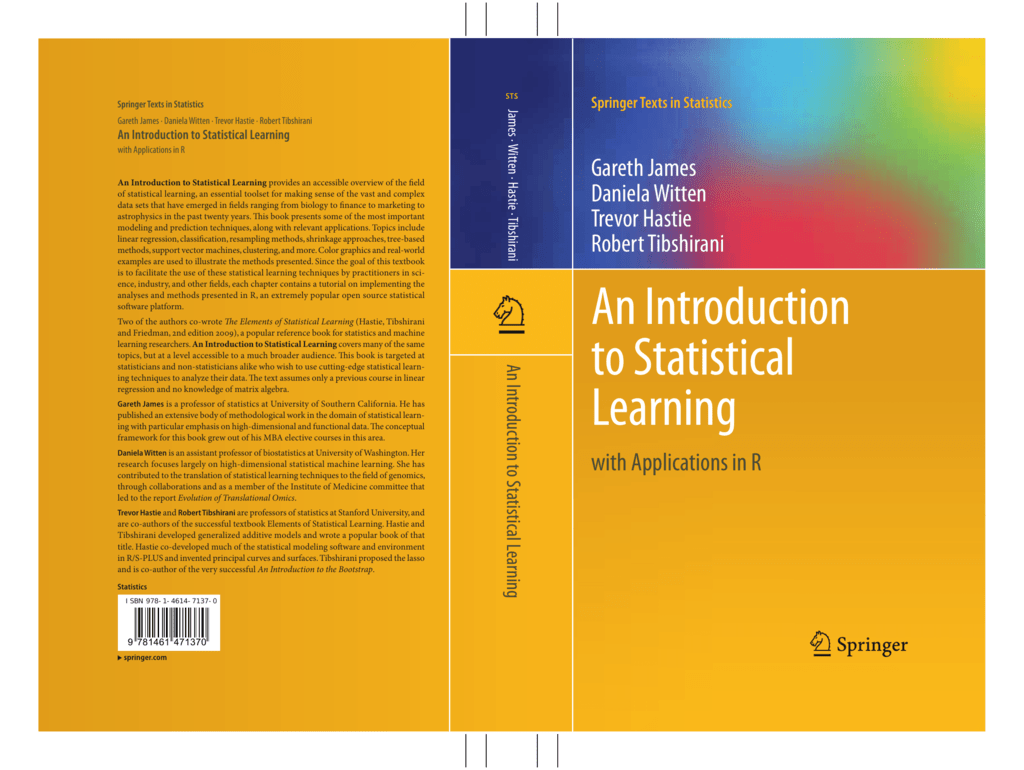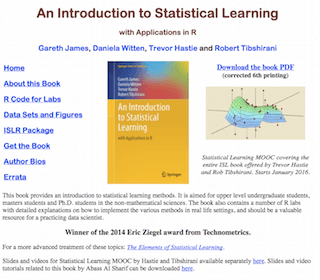
- #PDF AN INTRODUCTION TO STATISTICAL LEARNING FOR FREE#
- #PDF AN INTRODUCTION TO STATISTICAL LEARNING SOFTWARE#
I find it discouraging to need to stop partway though a text and go learn a whole new subject area before continuing.

> For the rest, I'm of the, perhaps naive, school of thought that one ought to jump in the deep end, and consult a variety of sources as need be.Īnd I suppose this is where you and I differ. But I also like that roadmap because after C&B, there's additional emphasis on Linear models which is helpful for ESL.

And a lot of C&B can be skipped (like the focus on ANOVA or experiment design). Honestly, as long as you get up to the level of the Casella & Berger text, you'll probably be fine. The orange nodes (Analysis, Topology, Functional Analysis, etc.) are extra. > Analysis, Topology, and proof-based Linear Algebra are certainly not needed for themĪlthough this is explained in the prose of the document, I should have highlighted it myself: only the nodes in blue are required. Not a problem! These are all just my opinions. > While by no means an expert, I'm inclined to respectfully disagree with the assessment of /u/scythmic_waves. With that out of the way, I'd highly, highly recommend Bishop as reading, after ISLR.Įdit: In response to your other comment, I also disagree: proofs, especially for regression problems, are important for understanding why we use them. Granted, you might find yourself picking these books up as your focus narrows, but for these books, you don't need them. iirc, most of Munkres, and Hoffman & Kunze are not needed for these books. For the rest, I'm of the, perhaps naive, school of thought that one ought to jump in the deep end, and consult a variety of sources as need be. I think the only hard pre-req would be a solid understanding of non-axiomatic probability up through the Law of large numbers. The Reddit roadmap is total overkill as a pre-req for ESL and Bishop (Analysis, Topology, and proof-based Linear Algebra are certainly not needed for them). While by no means an expert, I'm inclined to respectfully disagree with the assessment of /u/scythmic_waves. I'm a recent graduate from undergrad doing work in deep learning.
#PDF AN INTRODUCTION TO STATISTICAL LEARNING FOR FREE#
(I also found the whole story-proof concept a little strange.) Still, the fact that so much is online for free - including video lectures - makes it a great resource. I like the novelty of the challenging problems, but I wish they weren't so front and center in his presentation. Maybe because of his background in competition math? IDK. It's like Blitzstein reveled in tricking you with the unintuitive parts of probability. One other thing I'll add: I found stat110 and its companion book to focus a little too much on the "challenging" problems. In that one, you could probably get through ISL after the Hogg text. I'll again plug what I've been plugging in a few other comments. I think your references form a really solid sequence of prerequisites. > I'm planning to focus on statistics next with Blitzstein and Hwang's Introduction to Probability before returning to ISLR. It's just setting them up for failure when the SIMPLIFIED version expects them to be partway through a relevant degree.
#PDF AN INTRODUCTION TO STATISTICAL LEARNING SOFTWARE#
from another field, but not for, like, a random software developer who's got an interest in ML.

That's probably why it irks me so much that ESL gets brought up so much as the starting point for a lot of folks. Given that even ISL expects you to be partway through a university education in math and stats, if it's been a while or if you never studied linear algebra, statistics, or probability at that level in the first place, you won't be ready.

I think that tells you all you need to know about how difficult ISL ESL should be expected to be. So by that reading, the authors simplified ESL's material from "advanced training in the mathematical sciences" down to "advanced undergraduates or master's students in statistics or related quantitative fields". is appropriate for advanced undergraduates or master's students in statistics or related quantitative fields or for individuals in other disciplines who wish to use statistical learning tools to analyze their data. But ESL is intended for individuals with advanced training in the mathematical sciences. > One of the reasons for ESL's popularity is its relatively accessible style. I found that even Introduction to Statistical Learning made a few too many assumptions when I tried to work through it.


 0 kommentar(er)
0 kommentar(er)
